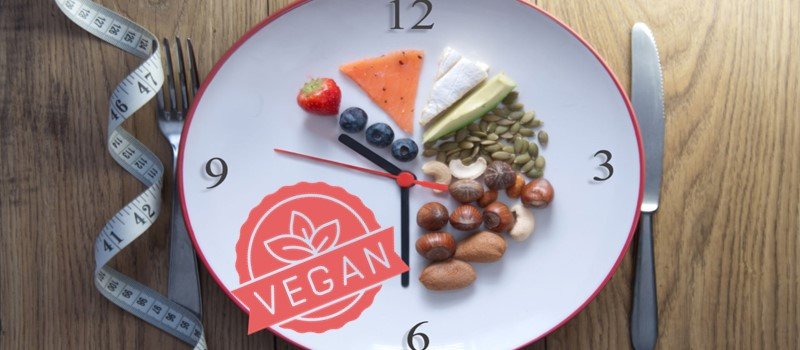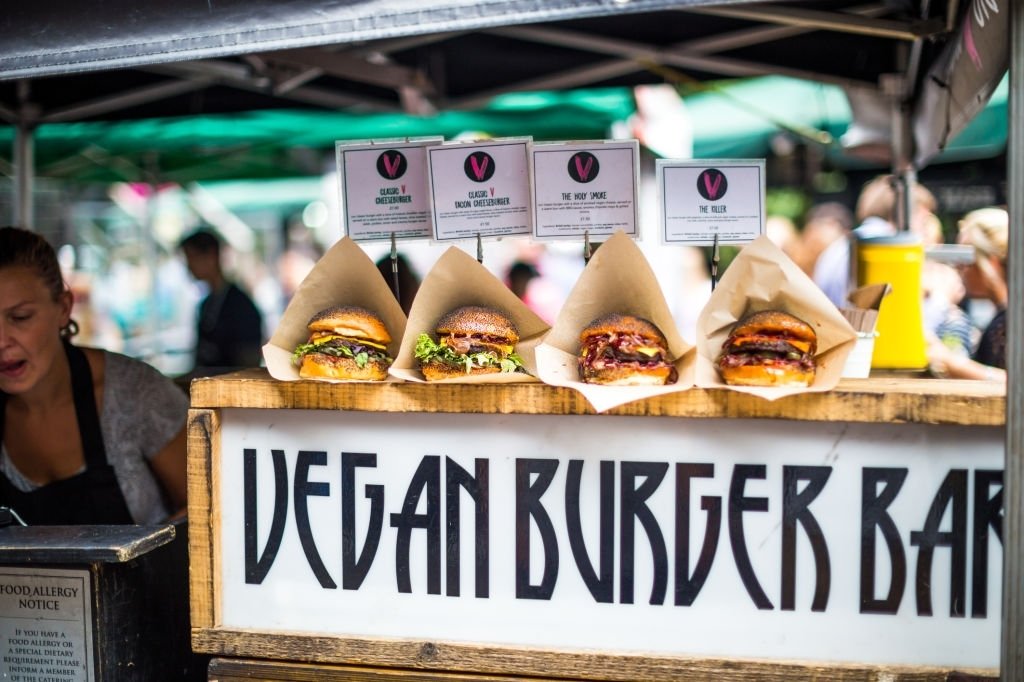It is possible to combine a vegan diet with intermittent fasting, but it is important to approach this combination in a mindful and well-planned manner to ensure that you are meeting your nutritional needs and maintaining good health. In this article, we will take you through our top tips for combining a vegan diet with intermittent fasting.

What Is Intermittent Fasting?
Intermittent fasting is an eating pattern that involves cycling between periods of fasting and non-fasting.
There are several different approaches to intermittent fasting, including the;
- 16/8 method (fasting for 16 hours and consuming all calories within an 8-hour window),
- 18/6 method (fasting for 18 hours and consuming all calories within an 6-hour window),
- 5:2 diet (eating normally for 5 days and restricting calories to 500-800 for the other 2 non-consecutive days), and
- alternate day fasting (consuming no or very few calories on alternate days).
That’s to name but a Few
Benefits of Intermittent Fasting
There are a number of benefits of intermittent fasting
- Promotes weight loss: Intermittent fasting can help you lose weight and reduce body fat by forcing your body to burn stored fat for energy.
- Reduces insulin resistance: Intermittent fasting can improve insulin sensitivity, which can lower your risk of type 2 diabetes and other metabolic disorders.
- Improves heart health: Intermittent fasting can reduce blood pressure, cholesterol, and triglyceride levels, which can lower your risk of heart disease.
- Boosts brain function: Intermittent fasting can improve cognitive function and increase brain-derived neurotrophic factor (BDNF), which is a protein that helps to protect and stimulate the growth of brain cells.
- Increases longevity: Intermittent fasting can increase lifespan and reduce the risk of age-related diseases such as cancer, Alzheimer’s, and Parkinson’s.
- Enhances immune function: Intermittent fasting can improve immune function by reducing inflammation and boosting the production of white blood cells.
- Improves gut health: Intermittent fasting can improve gut health by promoting the growth of beneficial gut bacteria and reducing gut inflammation.
- Increases energy levels: Intermittent fasting can increase energy levels by improving mitochondrial function, which is responsible for producing energy in your cells.
- Reduces oxidative stress: Intermittent fasting can reduce oxidative stress, which is a major contributor to aging and chronic diseases.
- Promotes autophagy: Intermittent fasting can promote autophagy, which is the process by which your body breaks down and recycles damaged cells and proteins, leading to improved cellular health.
But, is intermittent fasting advised if you are a vegan?
Intermittent Fasting As A Vegan
As a vegan, it is important to ensure that you are getting all the nutrients you need to support good health.
This can be challenging on a vegan diet, as some nutrients, such as protein, iron, and omega-3 fatty acids, can be more difficult to obtain from plant-based sources.
When combined with intermittent fasting, it is important to be extra mindful of your nutrient intake to ensure that you are meeting your needs.
One way to ensure that you are getting enough nutrients on a vegan intermittent fasting diet is to focus on nutrient-dense plant-based foods, such as leafy greens, nuts, seeds, and whole grains.
It is also a good idea to include fortified foods, such as fortified plant-based milks and cereals, which can help you meet your nutrient needs.
It is also important to be mindful of your hydration status when following a vegan intermittent fasting diet.
Fasting can increase the risk of dehydration, so it is important to drink plenty of water and other hydrating fluids, such as herbal teas and coconut water.
Risks of Combining Intermittent Fasting and a Vegan Diet
There are some potential risks to consider when combining a vegan diet with intermittent fasting. One concern is that fasting can increase the risk of nutrient deficiencies, particularly if you are not consuming a varied and balanced vegan diet.
For example, vegans are at risk of deficiencies in certain nutrients, such as vitamin B12, iron, and omega-3 fatty acids, which are important for maintaining good health.
Fasting can also increase the risk of disordered eating and may not be suitable for everyone, including individuals with a history of disordered eating, pregnant or breastfeeding women, and children and adolescents.
Finding What Works For You
It is also important to note that intermittent fasting is not a one-size-fits-all approach, and what works for one person may not work for another.
It is important to listen to your body and pay attention to how you feel while following a vegan intermittent fasting diet.
If you experience any negative side effects, such as feelings of low energy or malnutrition, it is important to adjust your diet or seek medical advice.
If you’re curious about the numerous ways a vegan diet can benefit your life, check out our in-depth article on The Advantages of a Vegan Diet.
Wrapping Up: Combining Intermittent Fasting With A Vegan Diet
In conclusion, it is possible to combine a vegan diet with intermittent fasting, but it is important to approach this combination in a mindful and well-planned manner to ensure that you are meeting your nutritional needs and maintaining good health. It is also important to listen to your body and pay attention to how you feel while following this type of diet, and to seek medical advice if you experience any negative side effects.

